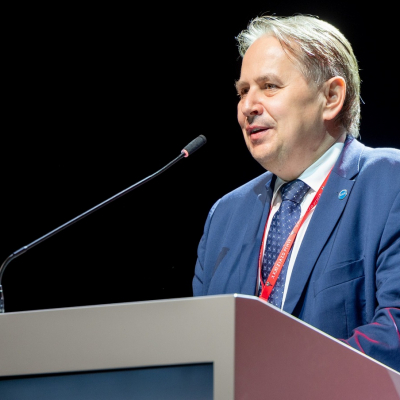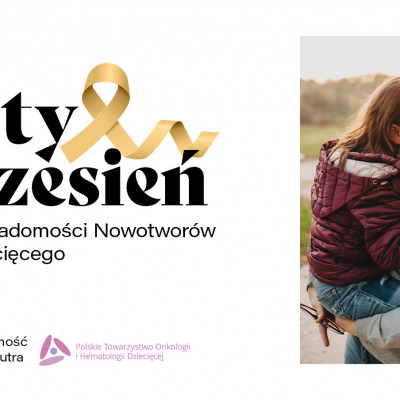Cancers in children are curable in more than 80 percent of cases, and the results of leukemia treatment in children in Poland are better than in Western Europe. The challenge is oncological vigilance on the part of parents and doctors, access to molecular diagnostics and individualization of treatment, pediatric oncologists and hematologists emphasize.
September is Children's Cancer Awareness Month, as reminded by the Gold September campaign, celebrated around the world. This year, the organizers of the Polish Golden September want to emphasize above all that pediatric cancers are curable to a large extent, but the most important thing is that both parents and family doctors and pediatricians should not underestimate alarming symptoms. Access to modern molecular diagnostics and the ability to tailor treatment to the cancer in a particular child are also prerequisites for improving treatment outcomes.
Necessary oncological vigilance
The symbol of Children's Cancer Month is the color gold, because gold symbolizes what is most important in life - a child's health.
- We would like to cure 100 percent of children who develop cancer, so that none die from it. When detected early, the cure rate is as high as 95-100 percent, so we want to make the whole society, especially parents, aware that cancer in children exists and sensitize them to potential symptoms. Sometimes we are amazed at how long the time passes from the appearance of a lump in a child, for example, until the child comes to the doctor with this problem. We also want to further sensitize pediatricians and family doctors. Tumors in children are rare diseases; but on the other hand, they are the second cause of death in children in Poland, after injuries and accidents, says Prof. Tomasz Szczepanski, president of the Polish Society of Pediatric Oncology and Hematology.
About 1,100-1200 new cases of cancer in children are diagnosed in Poland every year. The first symptoms are non-specific; they may include a change in behavior, loss of appetite, pain in the limbs, deterioration of physical performance, rapid fatigue, recurrent fevers or subfeversions (not caused by infection), headaches, nausea, vomiting, especially in the morning (despite the absence of infection), a tendency to bruise (without trauma), the appearance of petechiae.
- These symptoms do not necessarily mean cancer, however, if they persist, it is necessary to go to the doctor. No one knows a child better than a parent, so it is usually the parent who notices the first symptoms. However, they must be paid attention to by everyone who comes into contact with the child: at school, kindergarten and other places where the child is. We need to constantly remind people of this," points out Prof. Jan Styczynski, MD, national consultant in pediatric oncology and hematology.
Many people are still unaware that even an infant can develop cancer. Pediatricians and family doctors also need to be more vigilant about oncology. - During the balance examination, the doctor should carefully examine the child's skin, examine the lymph nodes, abdomen, testicles in boys. If he or she has any doubts, he or she should order tests, e.g. morphology with smear, abdominal ultrasound, ultrasound of lymph nodes, testicles," stresses Professor Katarzyna Derwich of the Department of Pediatric Oncology, Hematology and Transplantology at Karol Marcinkowski University in Poznan.
One of the most difficult problems is diagnosing cancer in adolescents, who are often ashamed to say that something worrying is going on. - There are situations where one wonders why the parent didn't pay attention earlier, why the disturbing symptom was ignored. I'll never forget a young man with a monstrously large testicular tumor that had been growing for several months. No one knew something was going on until the boy was in pain," adds Prof. Tomasz Szczepanski.
Molecular diagnostics and innovative treatment
Golden September is also organized to show that the fear of diagnosis should not paralyze and should not be the reason for delaying a visit to the doctor. The sooner cancer is diagnosed, the less aggressive treatment is possible, causing fewer possible complications, and the greater the chance of a cure.
Pediatric oncologists and hematologists are pleased that the ability to perform precise diagnostics, including molecular diagnostics, has recently improved significantly. - In 95 percent of cases, diagnostics are already publicly funded. Thanks to clinical trials, and also thanks to foundations that support pediatric oncology and hematology, we can in the most difficult cases, when conventional treatment fails, use therapies that are not yet reimbursed, or that are off label or even still experimental. Foundations around the world work in a similar way, it is often thanks to them that there is an opportunity to innovate," Professor Szczepanski points out.
Individualization of treatment also plays a big role. - Our biggest challenge is to be able to use treatment tailored to the patient. It is necessary to do molecular research to find out what type of cancer it is, to identify in the cancer cells where we can hit in order to treat the child effectively," explains Prof. Wojciech Mlynarski, MD, head of the Department of Pediatrics, Oncology, Hematology and Diabetology at the Medical University of Lodz.
Clinical trials also play a major role in access to state-of-the-art diagnostics and treatment for a difficult prognosis. - Thanks to our participation in a large non-commercial clinical trial, we now have the possibility of a very modern treatment for acute lymphoblastic leukemia. We can offer very high quality diagnostics and treatment," Professor Derwich points out.
- For me, the most optimistic information testifying to the state of oncology and hematology in Poland is the report of the EU Health Committee, which summarized the results of treatment of various cancers in Europe. It confirmed that the results of treatment of pediatric hematology are the same as the European average, and in the case of leukemia we even have a higher cure rate. This is the result of many years of work by many people. The challenge is to maintain this result and improve it even further," stressed Prof. Jan Styczynski.
Psychological support, rehabilitation, long-term care
In recent years, there has been a growing awareness that the patient's psyche plays an important role in cancer treatment. - Psychological support for the sick child and his parents is essential. This is now possible in the wards, often thanks to foundations that help us and pay psychologists. It is good that there are psychologists, but systemic solutions would be useful in this regard," Professor Mlynarski points out.
Another challenge is to improve access to rehabilitation, which is also an integral part of oncological treatment. - It is financed by the National Health Fund, but the number of reimbursed treatments, for example for a child after brain tumor surgery, is definitely insufficient, adds Prof. Mlynarski.
At the state-of-the-art pediatric oncology clinic in Poznań, which was handed over last year, both rehabilitation and psychological, neurologopedic and dietary care, if needed, are available for young patients, in addition to comprehensive diagnostics and treatment. - We have a rehabilitation room, educational rooms, there is a psychologist, dietician, rehabilitator, neurologopedist; however, they are paid from extra-budgetary funds, financed by foundations. The situation is similar in other centers in Poland, each center has to solve this problem on its own. However, it would be worth thinking about systemic solutions," Prof. Derwich points out.
It also remains a challenge to organize long-term care for the recovered, to monitor distant side effects, so that the quality of life of children cured of cancer is as good as possible, so that they can be fully active members of society. - There are many challenges ahead: we need to raise awareness of the problems of this group of patients, both among pediatric oncologists and hematologists, and among oncologists and hematologists treating adults, as well as among other health care professionals, says Prof. Derwich.
Golden September 2023 in Poland
Golden September was initiated as International Childhood Cancer Awareness Month by US President Barack Obama in 2012. The idea was promoted by Childhood Cancer International (CCI), an international association of parents' organizations. In Poland, the Golden September campaign is led by the Polish Society of Pediatric Oncology and Hematology (PTOHD) and many organizations supporting children with cancer and their families.
Every September, the PTOHD Educational Academy is held for pediatric oncologists to expand their knowledge of pediatric cancer diagnosis and treatment. - This year's Educational Academy program is very rich; it includes lectures on molecular oncology, immunotherapy, transplantation, non-oncology hematology and infectious complications in pediatric oncology, as well as topics closer to everyday clinical practice, such as interpretation of laboratory results, problems of the doctor on duty in pediatric oncology and hematology, workshops at the Medical Simulation Center, and the issue of professional burnout of doctors in pediatric oncology and hematology. There will also be an integration meeting of associations and foundations supporting pediatric oncology and hematology clinics under the motto "Together we can do more" - notes Prof. Jacek Wachowiak, head of the Department of Pediatric Oncology, Hematology and Transplantation at the Poznan University.
Partners of the Golden September campaign around the world, in a gesture of solidarity, illuminate famous buildings with golden light, including the Tower of London, skyscrapers in Toronto. In Poland, the Palace of Culture in Warsaw was illuminated, as well as buildings in Gdansk, Katowice, Wroclaw, among others. Also this year, distinctive buildings (such as the Spodek in Katowice) will light up as a sign of solidarity. On September 10, the Golden September celebration was inaugurated in Lublin (among other things, an educational game was held, and the educational tent city offered information on diagnosis and treatment). Patient organizations also joined the Golden September campaign, including the Iskierka Foundation, the Na Ratunek Dzieciom z Chorobą Tumorą Foundation, as well as the Student Scientific Circle of Pediatric Oncology and Hematology at the Department of Pediatric Oncology, Hematology and Transplantology in Poznań, the Onkorodzice.pl portal, onkologia-dziecięca.pl, hematoonkologia.pl, zlotywrzesien.pl, among others.


